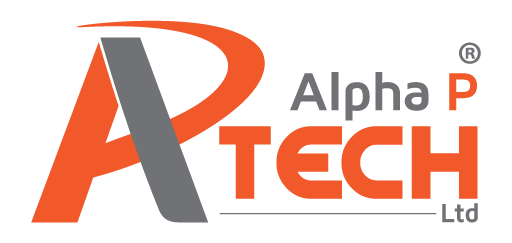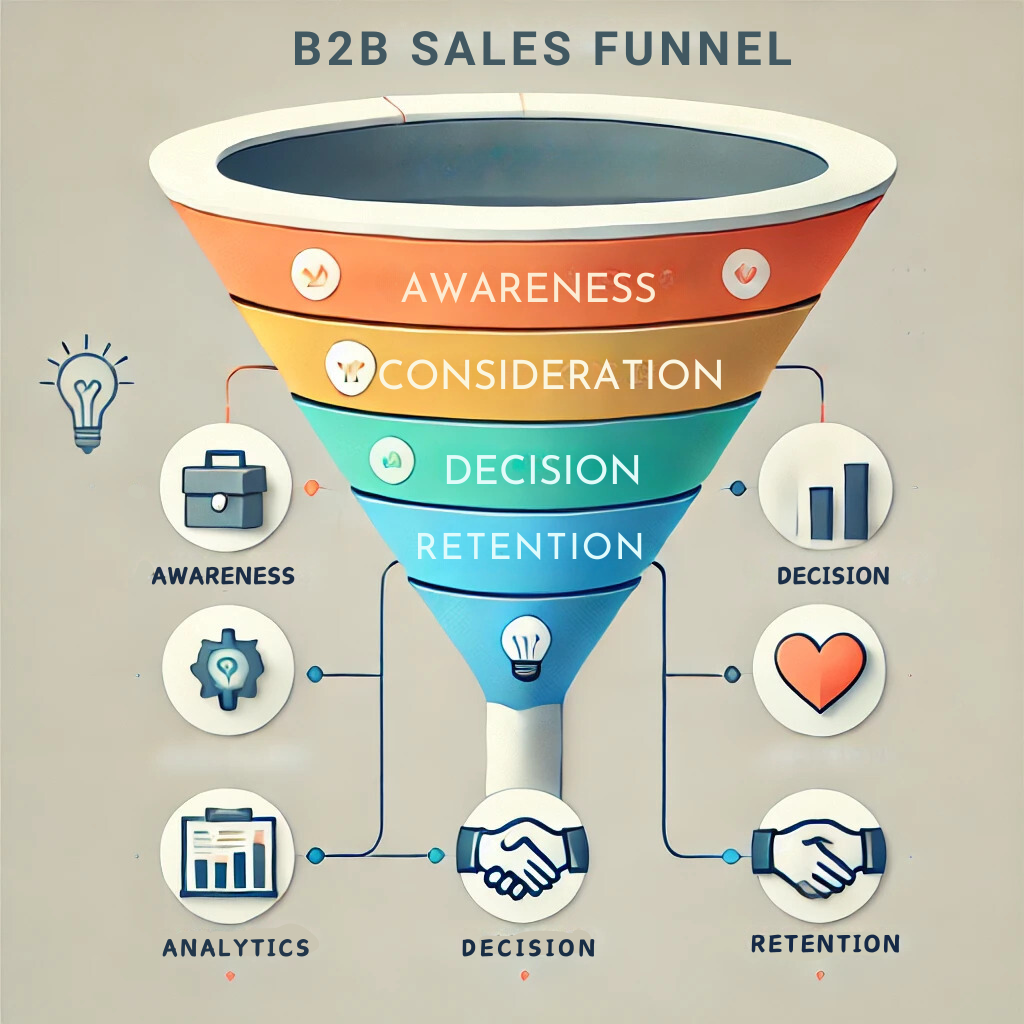The Key to Driving Growth: Optimising Your Sales Funnel
Optimising your sales funnel is one of the most impactful ways to drive growth and improve conversions in B2B sales. However, the journey from prospect to customer is far from straightforward—it is characterised by longer buying cycles, multiple decision-makers, and complex touchpoints. Without a strategic approach, businesses risk losing valuable leads at critical stages of the funnel.
In this article, we’ll explore key B2B sales strategies to optimise each stage of the sales funnel, ensuring a smoother path to conversion. You’ll also learn how marketing automation can enhance efficiency, personalise engagement, and deliver measurable results. Whether you’re refining your current processes or building your funnel from scratch, these actionable insights will help you convert more leads into loyal customers.
The complexity of B2B sales funnels necessitates tailored strategies that address different stakeholders’ unique needs and priorities.
What is a B2B Sales Funnel?
A B2B sales funnel is a process that outlines the journey potential customers take from first becoming aware of a product or service to making a purchase and becoming loyal clients. It typically consists of four key stages: Awareness, Consideration, Decision, and Retention.
- The Awareness stage – At this stage, potential buyers identify their problems and seek solutions.
- The Consideration stage – potential buyers evaluate options and compare providers.
- The Decision stage – stakeholders narrow down choices and commit to a solution.
- The Retention stage – focuses on nurturing long-term relationships and turning customers into loyal advocates.
Unlike B2C funnels, where buying decisions are often immediate and individual, B2B sales funnels are characterised by longer buyer journeys and multiple decision-makers. This complexity necessitates tailored B2B sales strategies that consider each stakeholder’s distinct roles, motivations, and concerns. For example, while one stakeholder may prioritise technical features, another might focus on budget constraints. Addressing these diverse priorities requires strategic messaging and synchronised efforts between sales and marketing teams to deliver consistent value at every touchpoint.
This is where audience segmentation becomes critical for effective sales funnel optimisation. You can create personalised strategies that resonate with each group by segmenting your audience based on factors such as industry, company size, pain points, or decision-making roles. When paired with marketing automation, this segmentation becomes even more powerful. Automation tools streamline the delivery of targeted content, such as tailored email campaigns or retargeted ads, ensuring prospects receive the right message at the right time. This saves time for your team and enhances the buyer experience, increasing the likelihood of conversion and long-term retention.
Optimising Each Stage of Your Sales Funnel for Success
Top of the Funnel (Awareness Stage)
The Awareness stage is the foundation of successful sales funnel optimisation, where the goal is to attract potential leads and introduce them to your brand. This stage requires strategic use of content marketing, SEO, and social media campaigns to maximise visibility and engagement. Blog posts, whitepapers, and how-to guides are excellent tools for addressing your audience’s initial questions and positioning your business as a trusted authority in the industry. By optimising your content for relevant keywords, you ensure that your solutions appear in search results when prospects are actively seeking answers.
Building trust at this stage is critical. That means offering informative, engaging content without pushing for an immediate sale. Instead, focus on delivering value, which can encourage prospects to move further along the funnel.
Marketing automation becomes invaluable for managing and scaling these efforts. Automation tools can help nurture leads by delivering personalised follow-up emails, distributing targeted content, and tracking engagement metrics. By automating these processes, businesses can engage a larger audience more efficiently while ensuring each prospect feels personally addressed, paving the way for a seamless transition to the next stage of the funnel.
Middle of the Funnel (Consideration Stage)
Potential customers begin evaluating their options at the Consideration stage, making it essential to nurture leads effectively. At this stage, targeted email campaigns, webinars, and case studies can play a pivotal role in showcasing your expertise and the value your solutions provide. For example, a case study demonstrating measurable outcomes can help prospects see how your offering addresses their specific pain points.
Lead scoring becomes a key component of sales funnel optimisation in the Consideration stage. By assigning scores based on a prospect’s engagement levels—such as downloading a whitepaper or attending a webinar—you can prioritise those with the highest purchase intent. This ensures your sales team focuses its efforts on the most promising leads.
To further enhance this process, CRM tools enable tracking interactions and tailoring follow-ups based on lead behaviour. Marketing automation helps you deliver personalised content and timely reminders, ensuring your engagement feels relevant and valuable. By refining these strategies, you can guide prospects smoothly towards the Decision stage.
Bottom of the Funnel (Decision Stage)
In the Decision stage, prospects evaluate their final options and commit to a purchase, making it crucial to present clear, compelling value propositions. At this stage, sales funnel optimisation means demonstrating exactly how your solution meets their needs. Product demos, testimonials, and ROI calculations are powerful tools to build confidence and reinforce your offering’s unique benefits. For instance, a detailed demo can highlight practical applications, while testimonials provide social proof that others have achieved success with your product or service.
Addressing objections is another critical aspect of this stage. Personalised outreach, such as tailored emails or one-on-one consultations, allows you to respond directly to specific concerns. For more guidance on expertly utilising personalisation, check out Alex’s article “The Power of Personalisation: Redefining B2B Marketing for Lasting Success.” A well-prepared FAQ section can also pre-emptively alleviate doubts, ensuring prospects feel informed and reassured.
Finally, streamlining the purchasing process is essential for closing the deal. Minimising friction through simplified contracts, transparent pricing, or easy-to-navigate payment systems ensures a seamless experience that leaves a positive impression, paving the way for a successful partnership and future retention.
No one perfects their sales funnel on the first attempt; all funnels require ongoing fine-tuning to achieve optimal results.
Using Data and Analytics to Refine Your Sales Funnel
Continuous improvement is at the heart of effective sales funnel optimisation, and leveraging data and analytics is key to refining your approach. No one gets their sales funnel perfect on the first attempt; all sales funnels require ongoing fine-tuning to achieve optimal results. You can gain valuable insights into your funnel’s performance by tracking key performance indicators (KPIs) such as conversion rates, lead velocity, and customer acquisition cost. These metrics help identify areas where prospects are dropping off or where efforts yield the highest returns.
A/B testing is an essential component of optimisation, enabling you to test variations in content, calls-to-action (CTAs), and messaging at each funnel stage. For example, experimenting with different subject lines in email campaigns or testing the impact of a new landing page layout can provide actionable insights. Businesses can continually fine-tune their B2B sales strategies to better resonate with their audience by adjusting their approach based on performance results.
Analytics tools, such as those integrated with CRM and marketing automation platforms, streamline this process by providing a centralised view of data. These tools allow you to pinpoint bottlenecks and uncover opportunities for improvement, ensuring a more efficient and effective sales funnel. With data-driven strategies, you can make informed decisions that enhance conversions and deliver measurable outcomes.
Unifying Sales and Marketing for Seamless Funnel Performance
A cohesive funnel strategy relies heavily on aligning sales and marketing teams, making collaboration essential for effective sales funnel optimisation. When these teams work in silos, valuable opportunities can be missed, and prospects may fall through the cracks. By fostering a shared vision, businesses can create a seamless experience for leads at every funnel stage.
One key step towards alignment is establishing shared KPIs and objectives. This ensures both teams are working towards common goals, such as improving lead quality or increasing conversion rates. Regular communication is equally important—scheduling feedback loops, joint meetings, and progress reviews can help identify challenges and celebrate successes in real-time.
For actionable guidance on achieving this alignment, explore Alex’s article “How to Align Your Sales and Marketing Teams for Better B2B Results.” By integrating these B2B sales strategies into your approach, you can bridge gaps between teams, drive better outcomes, and improve the overall efficiency of your sales funnel.
Conclusion: The Power of Optimising Your Sales Funnel
In conclusion, effective sales funnel optimisation is critical for driving higher conversion rates and achieving sustainable growth in the B2B landscape. However, it’s important to remember that no one gets it right the first time—successful funnels are built through ongoing refinement and a willingness to adapt. By optimising each stage of the funnel through tailored B2B sales strategies, detailed audience segmentation, and data-driven insights, businesses can create a seamless journey that resonates with prospects and builds long-term relationships.
Everyone can benefit from help showcasing their best selves and unlocking their full potential. Aligning sales and marketing teams, leveraging marketing automation, and continuously refining your approach with analytics are all steps that require expertise and collaboration. Implementing these strategies takes effort, but the results are measurable and impactful.
If you’re ready to elevate your sales funnel performance, we can provide the support you need. Contact Alpha P Tech today to start optimising your funnel with a bespoke strategy tailored to your business needs and achieve better results from your B2B sales processes.



